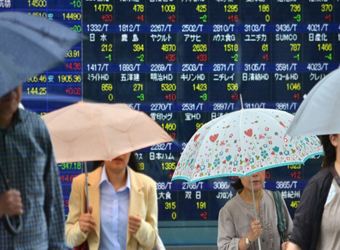Asian equities were mostly lower in early Wednesday trade as markets stateside digested the release of a series of emails from the son of President Donald Trump.
Japan’s Nikkei 225 slide 0.53 percent and South Korea’s benchmark Kospi edged down 0.13 percent in early trade.
Down Under, the S&P/ASX 200 declined 1.08 percent, driven lower by weakness in the financials and health care sub-indexes.
Greater China markets were mixed, with Hong Kong’s Hang Seng Index gaining 0.83 percent, but mainland markets edging lower. The Shanghai Composite was off 0.21 percent and the Shenzhen Composite shed 0.841 percent.
Trump Jr. released a chain of emails on Tuesday so that he could be “totally transparent” about events that transpired during a meeting with Russian lawyer Natalia Veselnitskaya in June last year. Veselnitskaya had said she had information that could prove “helpful” to the Trump presidential campaign. On Wall Street, stocks closed mixed after dipping on the release of Trump Jr.’s emails.
On Wall Street, stocks closed mixed after dipping on the release of Trump Jr.’s emails.
Reaction to the email appeared to have had a more lasting effect on U.S. Treasury yields and the dollar than the stock market, National Australia Bank currency strategist Rodrigo Catril said in a note.
The dollar index, which tracks the dollar against a basket of currencies, traded at 95.571 at 12:55 p.m. HK/SIN. The dollar had gained in Asian trade on Tuesday before ceding ground following Trump Jr.’s email release during U.S. trading hours.
The dollar was softer against the yen after trading at a four-month high in the previous session, with the greenback last fetching 113.37 yen.
Pressure on the dollar also saw the euro/dollar trade at its highest levels since May 2016. The common currency traded at $1.1486 to the dollar at 12:54 p.m. HK/SIN compared to a high of $1.1488 seen earlier in the session.
“Russia-gate makes for good headlines, but the market [is] focused on the immediate monetary policy tasks at hand. While Yellen will count, the real driver for near-term dollar sentiment will be this week’s U.S. CPI,” OANDA senior trader Stephen Innes told CNBC, adding that political tail risk remained concerning.
Central bank speak was also in the spotlight after Federal Reserve Governor Lael Brainard’s speech on Tuesday. While Brainard said the Fed was likely to move “soon” to unwind its massive portfolio, her comments on future interest rate hikes were perceived as dovish by the markets.
Ahead, Federal Reserve Chair Janet Yellen’s testimony before congress on July 12 U.S. time was also expected to be closely watched by investors.
Topics likely to crop up in the testimony included the timing of the Fed’s balance sheet unwind, its next interest rate hike, whether the central bank will allow the labor market to run hot and matters relating to Yellen’s successor, ING head of research Rob Carnell said in a Wednesday morning note.
While investors were unlikely to be “much wiser” on topics post-testimony, there was a sense that the Fed could “get on with” the unwind of its balance sheet, Carnell added.
Meanwhile, a speech from Bank of England Deputy Governor Ben Broadbent that skirted the issue of future rate hikes resulted in the British pound sinking against the euro.
Against the euro, the pound extended losses to trade at $1.1187 at 12:55 p.m. HK/SIN, after fetching as little as $1.1196 overnight. Pound/euro had traded around the $1.13 handle earlier in the week.
In other currency news, the Australian dollar inched higher following a positive read on the Westpac consumer confidence index for July. The Aussie dollar traded at $0.7651 at 12:55 p.m. HK/SIN compared to levels around $0.7640 seen before the news.
In energy news, Brent crude futures rose 1.45 percent to trade at $48.21 a barrel and U.S. crude futures gained 1.62 percent to trade at $45.78.
Over in Japan, Toshiba shares were up 1.87 percent following news the company was in talks with Western Digital after negotiations with a preferred bidder stalled, Reuters said. Western Digital had won a temporary court order on Tuesday that allowed it to access shared databases due to its joint venture with Toshiba, Reuters added.
In economic news, Japan’s June corporate goods price index increased 2.1 percent on year, aligning with analyst expectations, Reuters said. The index tracks the prices corporates charged each other for goods and services.
Investors also anticipated the Bank of Canada’s interest rate decision due during U.S. hours.
Source: CNBC


